Batu Caves Staircase – The Story Behind the Iconic 272 Rainbow Steps
Uncover the story behind Batu Caves’ famous 272 rainbow-colored steps—how they came to be, what they represent, and why they’ve become one of Malaysia’s most photographed landmarks.
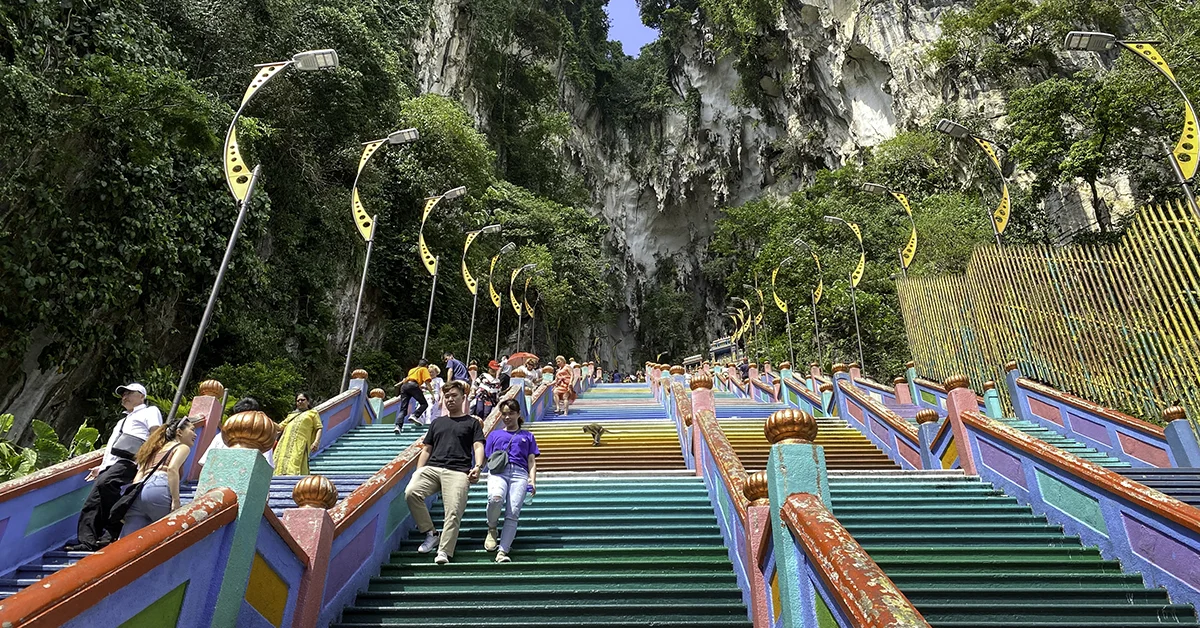
The Batu Caves staircase is more than just a colorful photo backdrop – it’s a vibrant gateway to one of Malaysia’s most sacred Hindu sites. Located just outside Kuala Lumpur, Batu Caves draws millions of visitors each year with its towering limestone cliffs, majestic Lord Murugan statue, and, of course, its iconic 272 rainbow-colored steps. For first-time travelers, understanding the story and significance behind the staircase will enrich your visit and help you prepare for the climb, both physically and culturally.
Planning your visit? Don’t go in unprepared.
Read our Batu Caves Tour Guide – Everything You Need to Know for dress code tips, transport advice, and insider insights that make your trip smoother and more meaningful.
History of the Batu Caves Staircase
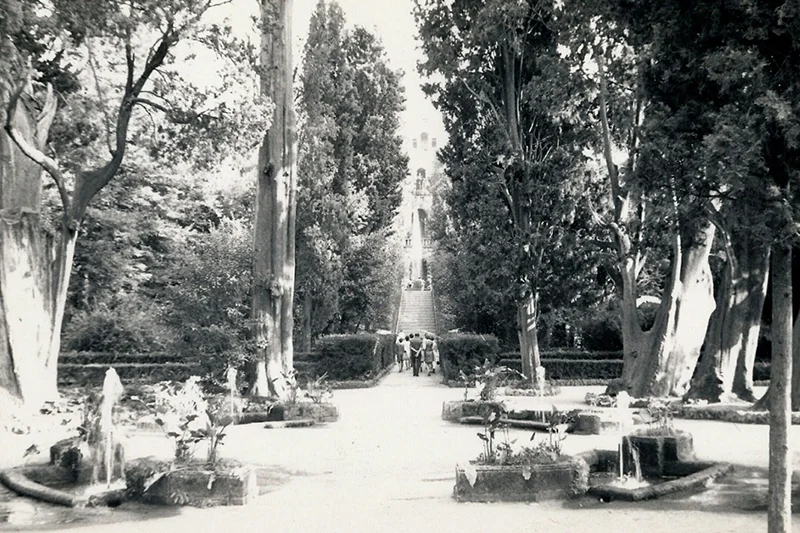
Long before the construction of the now-iconic 272 steps Batu Caves, devotees climbed the steep limestone hill to the Batu Caves temple cave by holding onto tree roots and branches. The challenging ascent was part of their spiritual journey. In 1920, a wooden staircase was constructed to ease the climb for worshippers, especially during the Thaipusam pilgrimage. Over time, the wooden steps deteriorated due to weather and heavy use.
Recognizing the need for a safer and more durable structure, temple chairman Mr. Ramachandra Naidu proposed building a concrete staircase. In 1939, the proposal was submitted to the Secretary of the Resident of Selangor under the British Government of Malaya. That same year, under new temple management, construction began on the now-famous 272-step concrete staircase.
To finance the project, the temple committee sold five plots of temple-owned land on Batu Road and purchased seven acres of land at the cave’s foothill for RM40,000. The local working community played a vital role—many donated a day’s wage of 50 cents toward the construction and related Thirupani works (Thirupani also spelled Thiruppani) is a Tamil term commonly used in Hindu temple culture, especially in South India and Malaysia. It refers to renovation, construction, or improvement works done for a temple or its surrounding facilities). Contributions also came from Mr. Vaithilingam Pillai from Teluk Intan, V.O.K. Kanapathy Pillai’s company in Kuala Lumpur, and the Kenneson Brothers, who supported both financially and logistically.
The collaborative effort of local communities, temple leaders, and philanthropists culminated in the staircase’s completion just in time for the 1940 Thaipusam festival. Coordinated by Mr. Ramachandra Naidu, who dedicated his time and energy to the project, the staircase became more than just a means to reach the Temple Cave—it became a symbol of unity, devotion, and community pride.
What Is the Batu Caves Staircase Today?
Modern visitors will find the staircase to be wide, well-maintained, and steep – gaining around 100 meters in elevation. The 272 steps are the only way to reach the Temple Cave at the top, making them a central part of the Batu Caves experience. Whether you’re climbing for religious reasons or sightseeing, expect a brief but intense workout, especially in Malaysia’s tropical heat.
The 272 steps are worth every climb — if you time it right.
Beat the heat and make the most of your visit by checking our Batu Caves Opening Hours Guide for the best times to go.
The Rainbow Stairs – A Controversial Makeover
In 2018, the Batu Caves staircase underwent a bold transformation. Each step was painted a different color, creating a stunning rainbow effect that instantly caught the attention of social media users around the world. Photos of the vibrant staircase went viral, turning Batu Caves into one of the most Instagrammed places in Malaysia.
While the makeover brought a surge in tourism, it also sparked controversy. Authorities from National Heritage Department claimed the renovation was done without proper heritage approvals, raising concerns about preserving the site’s authenticity. Despite the debate, the rainbow stairs remain a popular attraction, especially among younger travelers and content creators.
Climb the Stairs — Then Go Further
You’ll remember the steps. But with the right guide, you’ll remember the meaning behind them too. Our Batu Caves tours take you beyond sightseeing — into the stories that shaped Kuala Lumpur.
Best Combination Tour with Batu Caves Visit
Spiritual Significance of the Climb
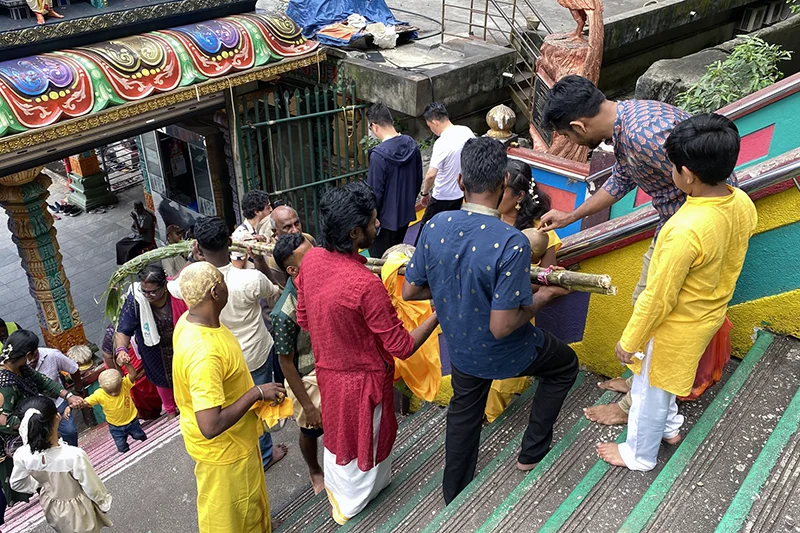
For Hindu devotees, climbing the 272 steps is more than just a physical challenge. It represents a journey of purification and devotion. During the annual Thaipusam festival, thousands of pilgrims ascend the staircase barefoot, often carrying heavy decorative frames called kavadi as a form of penance and prayer.
Even outside of festival days, many worshippers climb the stairs as part of their spiritual practice. The number 272 holds symbolic value, believed to represent the steps of spiritual growth toward enlightenment. First-time visitors are encouraged to be respectful during their visit, especially when observing or photographing rituals.
Climbing the Batu Caves Staircase – What to Expect
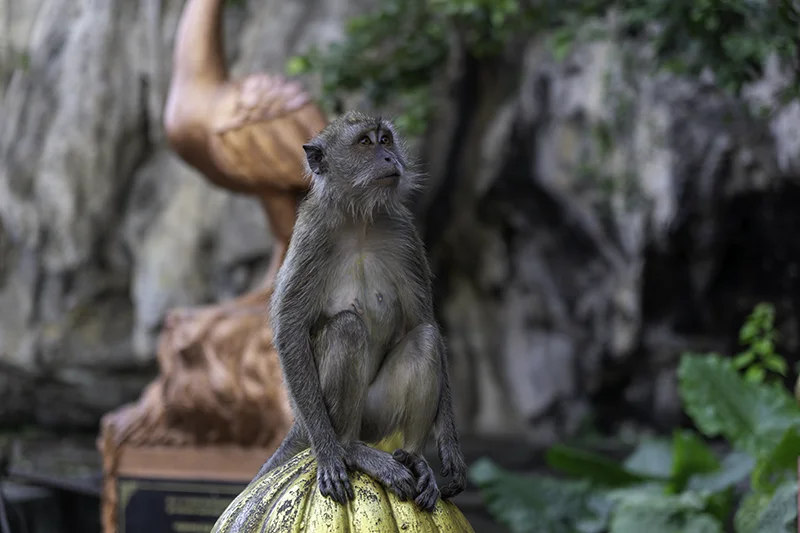
Climbing 272 Batu Caves rainbow stairs may not sound like much, but it can be challenging under Malaysia’s hot and humid weather. Wear comfortable shoes with good grip, and bring water to stay hydrated. The stairs are steep and often crowded, especially on weekends and holidays.
Be mindful of the macaques (monkeys) that roam freely along the staircase. They’re known to snatch bags, bottles, and snacks from unsuspecting visitors. Avoid feeding them and keep your belongings close.
Also, note that Batu Caves is a religious site. Modest dress is expected. For women, shoulders and knees should be covered. Sarongs are available for rent at the base if needed.
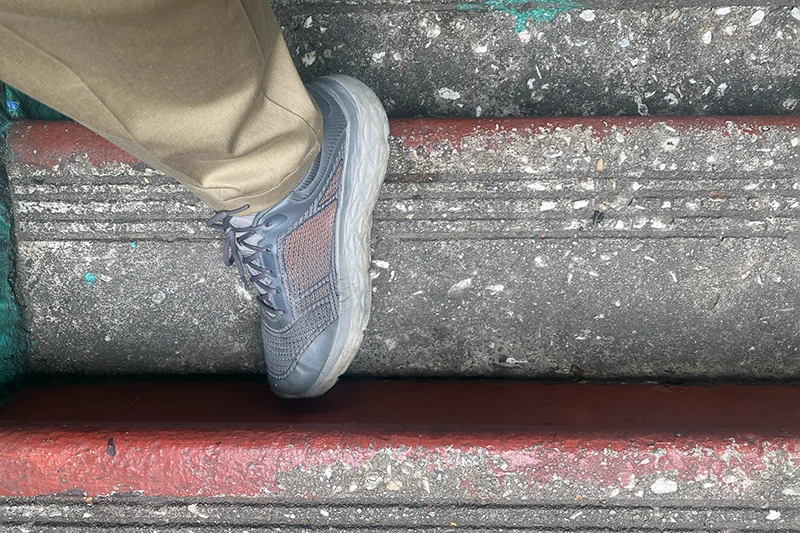
Each step is approximately 31 cm in width and was originally designed for barefoot climbing, especially by devotees during religious festivals. If you wear shoes and have a foot size larger than size 8, be extra cautious—particularly when descending—as the narrow steps can feel a bit tight, increasing the risk of slipping.
Instagram Fame & Responsible Tourism
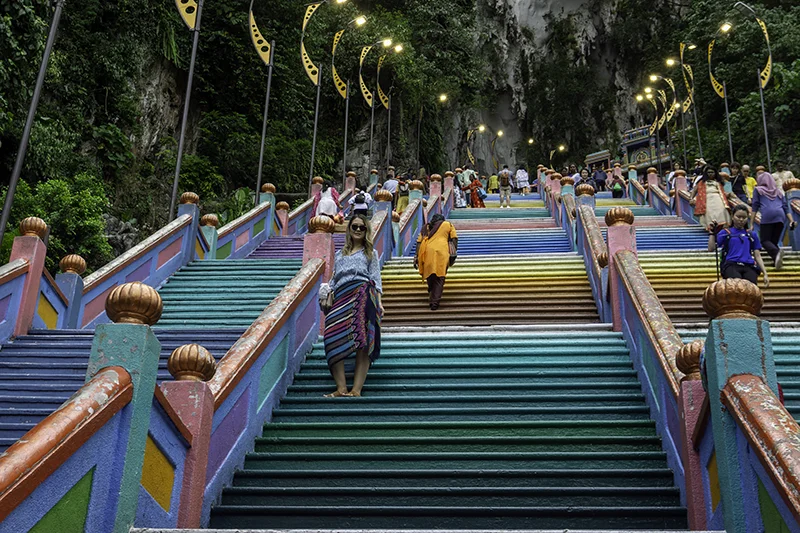
Thanks to its rainbow makeover, the Batu Caves staircase has become a social media favorite. It’s now a must-visit spot for Instagrammers and photographers. If you’re planning to snap some photos, try to arrive early in the morning for the best lighting and fewer crowds.
While capturing the beauty of the staircase, remember that it is still a place of worship. Be respectful when taking photos and avoid obstructing worshippers. Drones are not allowed, and flash photography should be used sparingly.
Wearing the wrong outfit could cut your visit short.
Check our Batu Caves Dress Code Guide to make sure you’re dressed right — and show respect while avoiding any surprises at the gate.
What Awaits at the Top
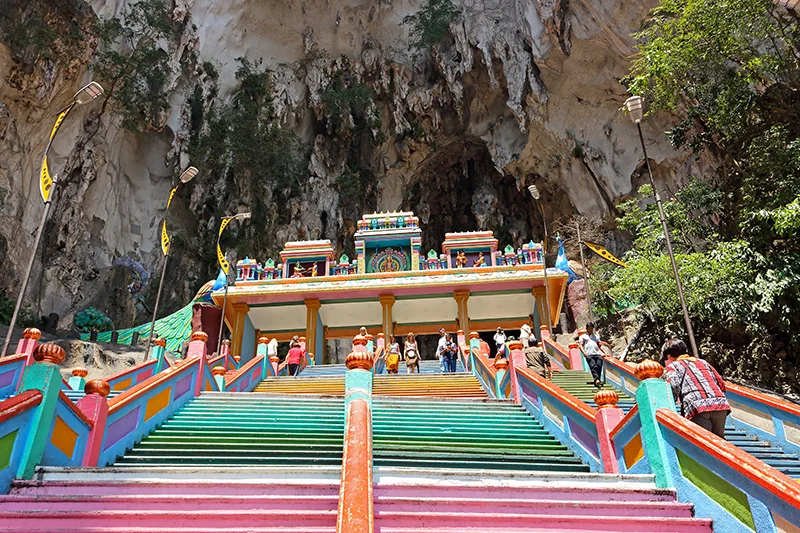
Once you reach the top of the stairs, you’ll enter the grand Temple Cave, home to several Hindu shrines. The cave is massive, with a natural opening that allows sunlight to pour in, illuminating the temple interiors.
Inside, you can observe religious ceremonies, admire the intricate statues and murals, and enjoy panoramic views of the surrounding landscape. Nearby attractions like the Ramayana offer more to explore if time permits.
Don’t let confusion ruin your experience.
Find the smoothest way to start your journey in our How to Get to Batu Caves Guide — whether you’re coming from the city or the airport.
Practical Info: How to Visit the Batu Caves Staircase
- Getting there: Batu Caves is about 30 minutes from Kuala Lumpur. You can take a KTM Komuter train (Batu Caves station) or book a guided tour.
- Opening hours: Batu Caves is open daily from 6:00 AM to 9:00 PM, but the staircase closes at 8:30 PM. Admission is free for all visitors.
- When to visit: Early mornings and after 3.00 PM are best to avoid crowds and heat. Avoid major public holidays unless you want to witness religious festivities.
- Combine Your Tour: Instead of only visiting Batu Caves, tourists can enhance their experience by combining it with other attractions—like watching fireflies in Kuala Selangor for a magical evening finale.
- Toilet: There are no toilets at the Temple Cave level. Visitors are advised to use the facilities at the base before starting the climb.
- Water: Bring your own water bottle to stay hydrated, especially in the tropical heat.
- Cash: Carry some cash with you, as many vendors and toilet facilities only accept cash payments.
Get inspired for your visit with all our Batu Caves travel tips and guides — from dress code to what to see and when to go.
Batu Caves Staircase Opening Time
The Batu Caves main gates open daily from 5:30 AM to 9:00 PM, giving early risers a head start to explore the area. However, the Batu Caves staircase is only accessible from 6:00 AM to 8:30 PM for safety reasons. If you’re planning to attend a religious ceremony, note that prayers (puja) typically begin at 7:00 AM inside the Batu Caves hindu temple.
- Are there alternative ways up? No elevators are available, so climbing is required to reach the Temple Cave.
- Can elderly people climb it? Yes, with rest stops along the way, but it can be physically demanding.
FAQs
Conclusion
The Batu Caves staircase is not just a climb – it’s a journey through faith, color, and culture. Whether you’re visiting for spiritual reasons, photography, or curiosity, understanding the story behind the 272 rainbow steps adds deeper meaning to your experience.
Planning more quick escapes from the city? Don’t miss our guide to the best day trips from Kuala Lumpur — perfect if you want to combine Batu Caves with firefly watching, tea plantations, or a beach break.


